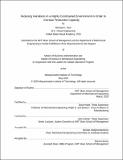Reducing variations in a highly constrained environment in order to increase production capacity
Author(s)
Ross, Michael C.M.B.A.Sloan School of Management.
Download1191226286-MIT.pdf (1.942Mb)
Other Contributors
Sloan School of Management.
Massachusetts Institute of Technology. Department of Mechanical Engineering.
Leaders for Global Operations Program.
Advisor
Dave Hardt and John Carrier.
Terms of use
Metadata
Show full item recordAbstract
Variations and the negatives effects it causes on production capacity and planning are topics of significant interest in the manufacturing communities. This research investigates the hypothesis that, when operating in a highly constrained environment, capacity can be gained by reducing the variations within the system. This study tests this hypothesis through simulation, data analysis, and controlled testing on the variations responsible for limiting capacity at Vektek LLC. The variability in lead times, quality, batch ordering, and demand forecasting contributes to the Bullwhip Effect. This increase in variability will cause excessive inventory, overtime costs, unacceptable service levels, high production costs, and large lead times. This research reduces these variabilities by isolating each cause of variability and placing standard work around it, such as SOPs. Once isolated and controlled, variations were methodically reduced, and significant capacity was gained. The research results show us that the overall variations were reduced by 26.5%. Due to this: overtime costs were reduced, late shipments were reduced by 40.0%, WIP inventories were reduced by 38.0%, and lead times were reduced roughly 22%. The total monetary value saved is estimated to be $988k and the total capacity gained was 30.8%. These results provide an initial validation that reducing the variations will increase the capacity.
Description
Thesis: M.B.A., Massachusetts Institute of Technology, Sloan School of Management, in conjunction with the Leaders for Global Operations Program at MIT, May, 2020 Thesis: S.M., Massachusetts Institute of Technology, Department of Mechanical Engineering, in conjunction with the Leaders for Global Operations Program at MIT, May, 2020 Cataloged from PDF version of thesis. Includes bibliographical references (pages 89-90).
Date issued
2020Department
Sloan School of Management; Massachusetts Institute of Technology. Department of Mechanical Engineering; Leaders for Global Operations ProgramPublisher
Massachusetts Institute of Technology
Keywords
Sloan School of Management., Mechanical Engineering., Leaders for Global Operations Program.